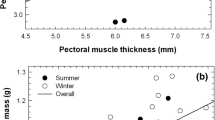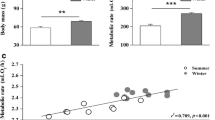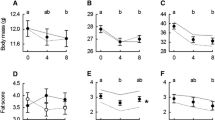Abstract
House finches (Carpodacus mexicanus) from the introduced population in the eastern United States were examined to assess metabolic characteristics and aspects of body composition associated with seasonal acclimatization. Wild birds were captured during winter (January and February) and late spring (May and June) in southeastern Michigan. Standard metabolic rates did not differ seasonally, but cold-induced “peak” metabolic rate was 28% greater in winter than late spring. The capacity to maintain elevated metabolic rates during cold exposure (“thermogenic endurance”) increased significantly from an average of 26.1 to 101.3 min in late spring and winter, respectively. House finches captured in the late afternoon during winter had twice as much stored fat as those during late spring. Both the wet mass and lean dry mass of the pectoralis muscle, a primary shivering effector, were significantly greater during winter. The seasonal changes in peak metabolism and thermogenic endurance demonstrate the existence and magnitude of metabolic seasonal acclimatization in eastern house finches. Increased quantities of stored fat during winter appear to play a role in acclimatization, yet other physiological adjustments such as lipid mobilization and catabolism are also likely to be involved.
Similar content being viewed by others
Abbreviations
- bm :
-
body mass(es)
- MR :
-
metabolic rate(s)
- MR peak :
-
peak metabolic rate(s)
- SMR :
-
standard metabolic rate(s)
References
Aldrich JW, Weske JS (1978) Origin and evolution of the eastern house finch population. Auk 95:528–536
Arieli A, Berman A, Meltzer A (1979) Cold thermogenesis in summer-acclimatized and cold-acclimated domestic fowl. Comp Biochem Physiol 63C: 7–12
Bakken GS (1990) Estimating the effect of wind on avian metabolic rate with standard operative temperature. Auk 107: 587–594
Bartholomew GA, Vleck D, Vleck CM (1981) Instantaneous measurements of oxygen consumption during pre-flight warm-up and post-flight cooling in sphingid and saturniid moths. J Exp Biol 90: 17–32
Belthoff JR, Gauthreaux SA Jr (1991) Partial migration and differential winter distribution of house finches in the eastern United States. Condor 93: 374–382
Bien CR (1976) Patterns of lipid storage and utilization in birds. Am Zool 16: 671–684
Bock CE, Lepthien LW (1976) Growth in the eastern house finch population, 1962–1971. Am Birds 30: 791–792
Brackenbury J (1984) Physiological responses of birds to flight and running. Biol Rev 59: 559–575
Buttemer WA, Hayworth AM, Weathers WW, Nagy KA (1986) Time-budget estimates of avian energy expenditure: physiological and meteorological considerations. Physiol Zool 59: 131–149
Carey C, Dawson WR, Maxwell LC, Faulkner JA (1978) Seasonal acclimatization to temperature in cardueline finches. II. Changes in body composition and mass in relation to season and acute cold stress. J Comp Physiol 125: 101–113
Castro G, Wunder BA, Knopf FL (1990) Total body electrical conductivity (TOBEC) to estimate total body fat of free-living birds. Condor 92: 496–499
Clark GA (1979) Body weights of birds: a review. Condor 81: 193–202
Cooper SJ, Swanson DL (1994) Seasonal acclimatization in the black-capped chickadee. Condor 96: 638–646
Dawson WR, Carey C (1976) Seasonal acclimatization to temperature in cardueline finches. I. Insulative and metabolic adjustments. J Comp Physiol 112: 317–333
Dawson WR, Marsh RL, Buttemer WA, Carey C (1983a) Seasonal and geographic variation in cold resistance in house finches Carpodacus mexicanus. Physiol Zool 56: 353–369
Dawson WR, Marsh RL, Yacoe ME (1983b) Metabolic adjustments of small passerine birds for migration and cold. Am J Physiol 245: R755-R767
Dawson WR, Smith BK (1986) Metabolic acclimatization in the American goldfinch. In: Heller HC et al. (eds) Living in the cold. Physiological and biochemical adaptations. Elsevier, Amsterdam, pp 427–434
Dawson WR, Marsh RL (1989) Seasonal acclimatization to cold and season in birds. In: Bech C, Reinertsen RE (eds) Physiology of cold adaptation in birds. Plenum Press, New York, pp 83–94
Dawson WR, O'Connor TP (1995) Energetic features of avian thermoregulatory responses. In: Carey C (ed) Avian energetics. Chapman and Hall, New York (In press)
Gauthreaux SA Jr (1982) The ecology and evolution of avian migration systems. In: Farner DS, King JR (eds) Avian biology, vol 6. Academic Press, New York, pp 93–167
Gelineo S (1964) Organ systems in adaptation: the temperature regulating system. In: Dill DB (ed) Handbook of physiology, section 4 Adaptation to environment, American Physiological Society, Washington, D.C., pp 259–282
Giaja J (1925) Le métabolisme de sommet et le quotient métabolique. Ann Physiol Physiochim Biol 1: 596–627
Hart JS (1962) Seasonal acclimatization in four species of small wild birds. Physiol Zool 35: 224–236
Hartman FA (1961) Locomotor mechanisms of birds. Smithson Misc Collect 143: 1–91
Helms CW, Drury WH (1960) Winter and migratory weight and fat: field studies on some North American buntings. Bird Banding 31: 1–40
Hill RW (1972) Determination of oxygen consumption by use of the paramagnetic oxygen analyzer. J Appl Physiol 33: 261–263
Hohtola E (1982) Thermal and electromyographic correlates of shivering thermogenesis in the pigeon. Comp Biochem Physiol 73A: 159–166
Hohtola E, Stevens ED (1986) The relationship of muscle electrical activity, tremor, and heat production to shivering thermogenesis in Japanese quail. J Exp Biol 125: 119–135
Kates M (1972) Techniques of lipidology: isolation, analysis, and identification of lipids. North Holland, Amsterdam
King JR (1972) Adaptive periodic fat storage by birds. Proc XV Int Ornithol Congr, pp 200–217
Marsh RL, Dawson WR (1989a) Avian adjustments to cold. In: Wang LCH (ed) Advances in comparative and environmental physiology. Springer, Berlin, pp 205–253
Marsh RL, Dawson WR (1989b) Energy substrates and metabolic acclimatization in small birds. In: Bech C, Reinertsen RE (eds) Physiology of cold adaptation in birds. Plenum Press, New York, pp 105–114
Marsh RL, Carey C, Dawson WR (1984) Substrate concentrations and turnover of plasma glucose during cold exposure in seasonally acclimatized house finches, Carpodacus mexicanus. J Comp Physiol B 154: 469–476
Mundinger PC, Hope S (1982) Expansion of the winter range of the house finch: 1947–79. Am Birds 36: 347–353
O'Connor TP (1995) Seasonal acclimatization of lipid mobilization and energy metabolism in house finches. Physiol Zool 68 (in press)
Pohl H, West GC (1973) Daily and seasonal variation in metabolic response to cold during rest and forced exercise in the common redpoll. Comp Biochem Physiol 45A: 851–867
Rogers CM, Rogers CJ (1990) Seasonal variation in daily mass amplitude and minimum body mass: a test of a recent model. Ornis Scand 21: 105–114
Root TL (1988) Atlas of wintering North American birds. University of Chicago Press, Chicago
Root TL, O'Connor TP, Dawson WR (1991) Standard metabolic level and insulative characteristics of eastern house finches, Carpodacus mexicanus. Physiol Zool 64: 1279–1295
Rosenmann M, Morrison P (1974) Maximum oxygen consumption and heat loss facilitation in small homeotherms by He-O2. Am J Physiol 226: 490–495
Stangel PW (1985) Incomplete first prebasic molt of Massachusetts house finches. J Field Ornithol 56: 1–8
Stokkan KA, Harvey S, Klandorf H, Blix AS (1985) Endocrine changes associated with fat deposition and mobilization in Svallbard ptarmigan (Lagopus mutus hyperboreas). Gen Comp Endocrinol 58: 76–80
Swanson DL (1990) Seasonal variation in cold hardiness and peak rates of cold-induced thermogenesis in the dark-eyed junco (Junco hyemalis). Auk 107: 561–566
Swanson DL (1991a) Seasonal adjustments in metabolism and insulation in the dark-eyed junco. Condor 93: 538–545
Swanson DL (1991b) Substrate metabolism under cold stress in seasonally acclimatized dark-eyed juncos. Physiol Zool 64: 1578–1592
Walsberg GE (1988) Evaluation of a nondestructive method for determining fat stores in small birds and mammals. Physiol Zool 61: 153–159
Weathers WW, Caccamise DF (1978) Seasonal acclimatization to temperature in monk parrots. Oecologia (Berlin) 35: 173–183
West GC (1965) Shivering and heat production in wild birds. Physiol Zool 38: 111–120
Author information
Authors and Affiliations
Additional information
Communicated by L.-C.-H. Wang
Rights and permissions
About this article
Cite this article
O'Connor, T.P. Metabolic characteristics and body composition in house finches: effects of seasonal acclimatization. J Comp Physiol B 165, 298–305 (1995). https://doi.org/10.1007/BF00367313
Accepted:
Issue Date:
DOI: https://doi.org/10.1007/BF00367313




